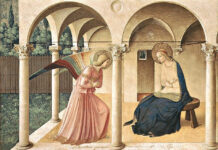
Saint Richard of Chichester (+1253) was a mediaeval bishop in Sussex – now the patron saint of that bucolic region in the south of England, whence hailed Hilaire Belloc. I’m not sure if he ever wrote of Saint Richard, but perhaps he did, and any reader who knows of such is free to send along the reference. Faced with the choice of running the family lands and marriage, or apostolic work for the Church, Richard chose the latter and objectively higher path, and never looked back. He was a staunch defender of the sanctity of the priesthood and the rights of the Church. Many clerics at the time were living in concubinage, and Richard spared no efforts to stamp out the disorder, that priests were called to conform their lives more perfectly to Christ’s own, in poverty and chastity. He himself was a lifelong vegetarian – as we mentioned of Saint Francis of Paola yesterday, for spiritual and ascetic reasons, not because ‘meat was bad’. Rather, as Belloc would have agree, because it was very good. Same thing with marriage: A very good thing, and it was only because it was so good, was it a sacrifice offered to God to give up the companionship of a wife and children, for the sake of the kingdom.
Like Thomas a Becket before him, and John Fisher after him, Saint Richard, bishop and sometime chancellor, also resisted the encroachments of the king in the rights and affairs of the Church. All three kings were named Henry, the second, eighth and third, respectively. Richard’s nemesis – Henry III – at one point forbade his subjects to ‘feed or house’ the bishop, to little avail, for, as Thomas More was to declare, we must be God and the Church’s servants first, before the king’s.
After his death, Saint Richard’s tomb became a place of pilgrimage, second only to Becket’s own shrine at Canterbury. Henry VIII, who seized far more power than his predecessors, had both shrines destroyed, the relics of the bishops scattered. But there is a legend that the faithful preserved some of these, hiding them from Cromwell’s agents. If one knows where, one may still venerate the bones of the good bishop Richard. May he give strength and courage to our current episcopate, facing in our own day and time the powers and principalities waging war against the Church, against the Lord, and against His anointed.
Here is a prayer composed by Saint Richard:
Gratias tibi ago, Domine Jesu Christe, de omnibus beneficiis quae mihi praestitisti;
pro poenis et opprobriis, quae pro me pertulisti;
propter quae planctus ille lamentabilis vere tibi competebat.
Non est dolor similis sicut dolor meus
Rendered into rather free English as:
Thanks be to Thee, my Lord Jesus Christ
For all the benefits Thou hast given me,
For all the pains and insults Thou hast borne for me.
O most merciful Redeemer, friend and brother,
May I know Thee more clearly,
Love Thee more dearly,
Follow Thee more nearly.
Amen.











